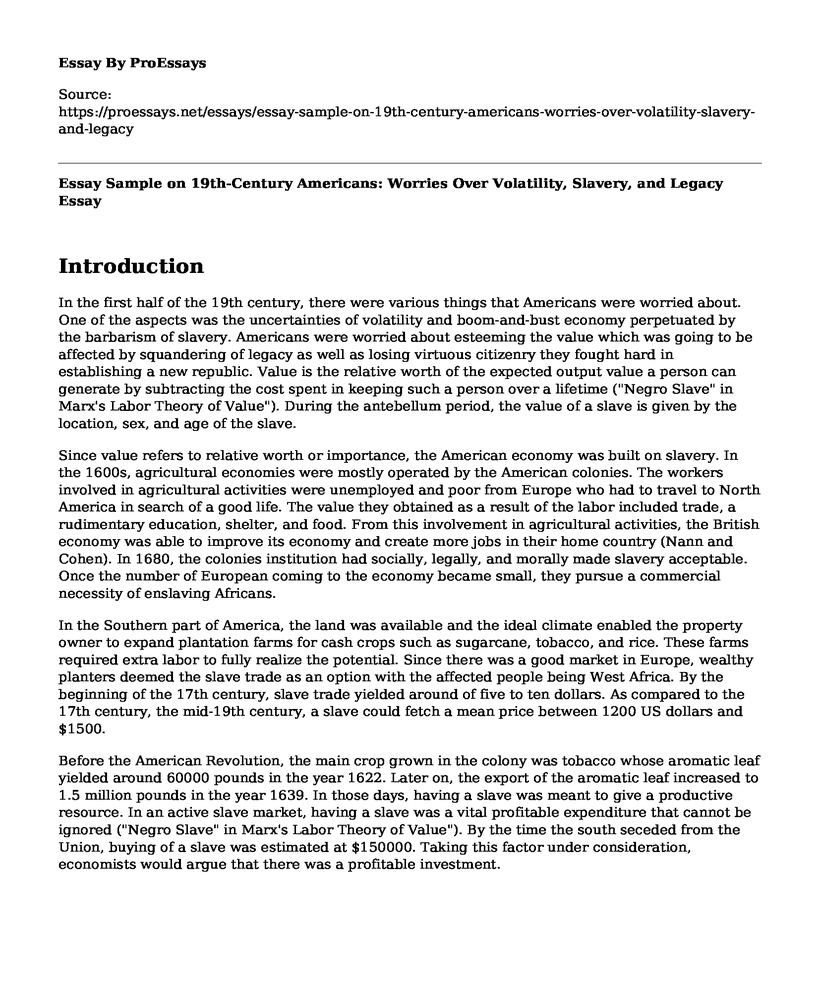Introduction
In the first half of the 19th century, there were various things that Americans were worried about. One of the aspects was the uncertainties of volatility and boom-and-bust economy perpetuated by the barbarism of slavery. Americans were worried about esteeming the value which was going to be affected by squandering of legacy as well as losing virtuous citizenry they fought hard in establishing a new republic. Value is the relative worth of the expected output value a person can generate by subtracting the cost spent in keeping such a person over a lifetime ("Negro Slave" in Marx's Labor Theory of Value"). During the antebellum period, the value of a slave is given by the location, sex, and age of the slave.
Since value refers to relative worth or importance, the American economy was built on slavery. In the 1600s, agricultural economies were mostly operated by the American colonies. The workers involved in agricultural activities were unemployed and poor from Europe who had to travel to North America in search of a good life. The value they obtained as a result of the labor included trade, a rudimentary education, shelter, and food. From this involvement in agricultural activities, the British economy was able to improve its economy and create more jobs in their home country (Nann and Cohen). In 1680, the colonies institution had socially, legally, and morally made slavery acceptable. Once the number of European coming to the economy became small, they pursue a commercial necessity of enslaving Africans.
In the Southern part of America, the land was available and the ideal climate enabled the property owner to expand plantation farms for cash crops such as sugarcane, tobacco, and rice. These farms required extra labor to fully realize the potential. Since there was a good market in Europe, wealthy planters deemed the slave trade as an option with the affected people being West Africa. By the beginning of the 17th century, slave trade yielded around of five to ten dollars. As compared to the 17th century, the mid-19th century, a slave could fetch a mean price between 1200 US dollars and $1500.
Before the American Revolution, the main crop grown in the colony was tobacco whose aromatic leaf yielded around 60000 pounds in the year 1622. Later on, the export of the aromatic leaf increased to 1.5 million pounds in the year 1639. In those days, having a slave was meant to give a productive resource. In an active slave market, having a slave was a vital profitable expenditure that cannot be ignored ("Negro Slave" in Marx's Labor Theory of Value"). By the time the south seceded from the Union, buying of a slave was estimated at $150000. Taking this factor under consideration, economists would argue that there was a profitable investment.
Conclusion
Ideally, the value of a slave refers to expected output value a slave can generate by subtracting the cost spent in keeping such slave over a lifetime. In determining the value of slave expected revenue, a list of factors such as location, age, sex, health, and physical condition of the workers must be considered. For instance, in southern agriculture, the slave was subjected to hard labor as opposed to free labor (Nann and Cohen). In other words, the slave could easily meet the expected produce without giving them freedom of choice. The present value of a slave referred to an estimate made by the current slave-owner. The younger adult males yielded more values as compared to old men because they were stronger.
Works Cited
Nann, John B., and Morris L. Cohen. The Yale Law School Guide to Research in American Legal History. Yale UP, 2018.
"The "Negro Slave" in Marx's Labor Theory of Value." The Fetish Revisited, 2018, pp. 60-77, doi:10.1215/9781478002437-003.
Cite this page
Essay Sample on 19th-Century Americans: Worries Over Volatility, Slavery, and Legacy. (2023, Jan 28). Retrieved from https://proessays.net/essays/essay-sample-on-19th-century-americans-worries-over-volatility-slavery-and-legacy
If you are the original author of this essay and no longer wish to have it published on the ProEssays website, please click below to request its removal:
- Funeral Oration of Pericles in the Ancient History Sourcebook
- Essay Example on John and Abigail Adams: Love, Politics & Revolution
- Sparta & Athens: Geographically Close, Culturally Different, Bitterly Rival - Essay Sample
- Essay Sample on Stono Rebellion: African Slaves' Uprising of 1739 in South Carolina
- Essay Sample on European Colonization of Africa: Impact and Resistance
- Essay Sample on Henry Ford: A Genius of Inclusion, Empathy, and Appreciation
- Modernity, Cultural Diversity and Its Impact on Society - Free Essay Sample







